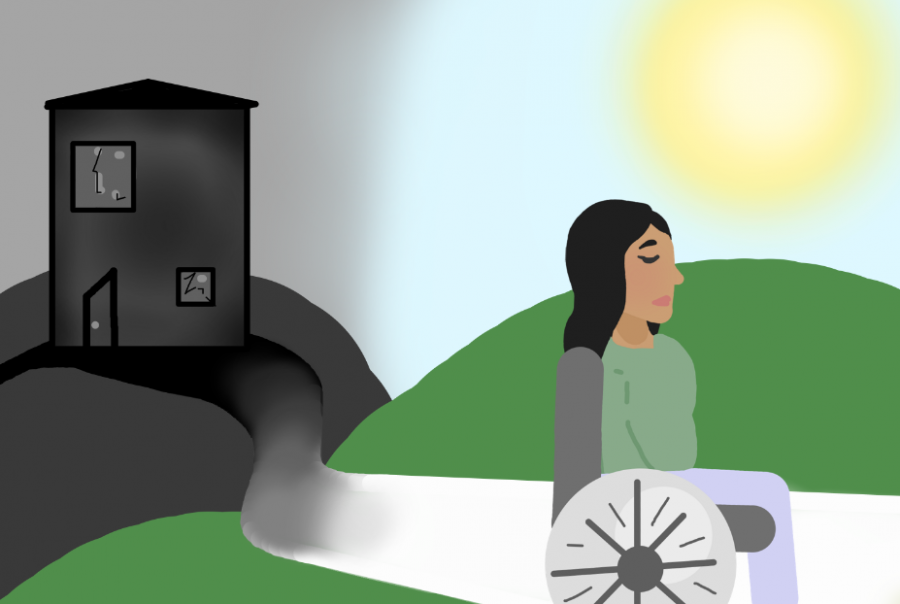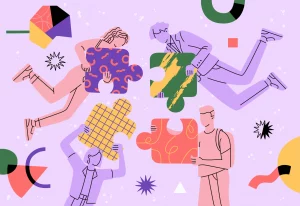Why It Is Hard For Disabled Women, Queer Persons To Leave Abusive Partners
- Geetika Mantri

Reema*, 32, has been married for about five years but the man she thought would be her life partner has turned out to be a stranger – he refuses to communicate with her and beats her when he is drunk. Her brother-in-law and parents-in-law joined in the violence if she, a deaf woman with low vision, erred in domestic work.
Reema is an orphan raised since infancy by a church in Mumbai. With some computer and vocational training, she managed to find a job as a housekeeping staff at a hotel in 2015. It was the nuns at the church who found her a husband when she turned 27. She was hesitant about the match – the man was much older, deaf, and even at the time, aloof, she recalled. “But the nuns and his parents were very insistent. They said he had a decent job and was a nice man. I just went ahead because they kept pushing me,” she says.
Three months ago, Reema left the abusive marriage and moved into a temporary shelter. When we spoke to her, she was still not sure if she wanted to end the marriage legally. “The other men I’d met refused to marry me because of my eyes but he married me in spite of it. I am not sure if I should leave him forever…” she says, communicating in sign language through Sangeeta Gala, her interpreter.
Samidha, 24, lives with multiple disabilities like chronic pain and Ehlers-Danlos syndrome, which affects connective tissues and impairs mobility. She works as an editor with the Revival Disability Project’s magazine, which highlights narratives of disability and sexuality, and is herself a survivor of intimate partner violence. What kept her in the relationship was the thought that she had a partner as a disabled person, she says.
“At the time, I felt like it was the best that I could do,” she says, referring to a relationship she had when she was 19. “I grew up not expecting relationships because of my disability. A lot of times when the abuse happened, deep down, I believed this is what I deserve. I had internalised so much hate towards myself and my body – how would anyone else respect me? How would anyone like me? I thought it was better to have someone than no one even if he was coercive and controlling.”
There is significant underreporting of domestic violence in India, as per an analysis by The Wire which compares reporting under section 498A (cruelty by husband or his relatives) as per the National Crime Records Bureau (2020) with the National Family Health Survey (NFHS) 2019-20 data. It should be noted that neither the NCRB nor the NFHS or any other national data source provides disaggregated information on domestic violence faced by LGBTQIA+ persons or disabled women with one or multiple disabilities. However, given their increased vulnerability to abuse and lack of access to relief and resources, it is not hard to imagine the extent of intimate partner violence (IPV) against disabled persons that likely goes under and unreported.
Our interviews revealed that intimate partner violence against disabled women and LGBTQIA+ persons takes on many forms other than those that are visible and physical. This includes acts of emotional cruelty, big and small, such as neglect, withholding of care, denial of financial support, and gaslighting, and more, detailed later.
Inadequate reporting
While violence against women in South Asia has been documented, there is little focus on those who are marginalised, including disabled people, says a 2012 research by Creating Resources for Empowerment in Action (CREA, a feminist international human rights organisation). Up to 54% of ever-married disabled women in India had faced violence from their affinal family, natal family, friends, and neighbours, said the study, Count Me In!, a report on violence against disabled, lesbian, and sex-working women in Bangladesh, India, and Nepal. Another study, which surveyed 5,122 women in Mumbai and was published in BMJ in April 2022, found that 10% of the respondents screened for functional disability were highly vulnerable to physical, sexual, or emotional partner violence.
In both studies, the women who faced IPV were also at higher risk of poor mental health.
There are multiple reasons that prevent victims from walking out of any abusive relationship – systematic isolation by the abuser from sources of support, erosion of self-confidence, inculcated dependence, and learned helplessness. These factors are even more profound for persons with disabilities, we found. Then there is low self-worth, feelings of being a “burden” to the caregiver. The lack of accessible infrastructure to enable independent mobility and report violence (which is also hindered by the lack of disability-informed social and legal structures) also further disadvantages disabled persons.
Further, questions like “Who would love my disabled self?” and “Who else will accept me?” are ones that women and people of marginalised genders and sexualities deal with, especially since they are not taught to aspire to romantic relationships or partnerships or express their sexuality, as Behanbox reported earlier.
When disability is weaponised
“For young adults with disabilities, opportunities of social interaction and of building one’s own identity and personality are negligible, which adds to their feelings of unworthiness. People with disabilities often face a lot of stigma and judgment. They are either looked upon with disgust or with pity and embarrassment,” says the Sexuality and Disability report by TARSHI. It adds that young persons with a disability grow up feeling unattractive and unworthy and are likely to be so gratified by any positive attention that they would endure abuse to hold on to it.
It took eight years for Payal Kapoor to reach what she describes as “a point of no return” in an abusive marriage. From 2002 to 2010, Kapoor, a disability advocate who is blind and partially deaf, tried to make the marriage work, giving herself reasons to not leave. “I didn’t want to quit without giving it a real shot,” she says. “Surprisingly, there was no pressure to ‘adjust’ in the marriage from my family. It was I who was against giving up, telling myself all relationships take work, and wondering what would happen to the life I had built, especially as a person with disability.”
Kapoor has written about her experience for a publication of Point of View that focuses on sexuality and disability. In the article, ‘Venus Flytrap: The Story of a Marriage’, she recalls the rosy beginnings of her relationship, the blues of cohabiting as a married couple, and then the slide downhill. There was the burden of household work and unreasonable reprimands for common errors, giving up leisure activities like watching TV or listening to her favourite music to “keep the peace”. There was also emotional abuse: her husband’s refusal, for instance, to eat what she cooked and then having instant noodles on the sly so she would believe he had gone hungry.
Neglect became a means to weaponise her disability: “He spoke softly and sometimes I had difficulty hearing him. But if I asked him to repeat himself, he would walk away,” she wrote. Kapoor also wrote of gaslighting, a form of emotional manipulation where the victim is made to feel like the perpetrator.
‘Who would support me if I leave?’
In the case of disabled individuals, abuse can take on many shapes and shades that are subtle and do not include overt violence. For instance, walking away in the literal sense is what many disabled survivors of IPV like Samidha, who uses a wheelchair on a need basis, cannot do. “There was this one incident where we had gone on a trip and he accused me of cheating on him, and in my anger, I retorted, ‘So what if I am?’ because I was tired of explaining myself and not being believed. I developed a very high fever that night and he withheld care, saying he didn’t know how to handle someone who is so sick,” she says. Samidha found herself censoring her speech for fear of being neglected. “Who would push my wheelchair and give me the support I needed?” she recalls thinking.
Abuse that is not overtly physical ends up being overlooked, says counsellor and disability rights advocate Abha Khetarpal, who is also the president of Cross the Hurdles, a disability rights network and organisation.
“Neglect is one of the forms, especially the neglect of secondary health conditions of a disabled person. The disabled woman may be made to feel guilty or obligated, say, if she falls sick, by being told that her health is a burden on the caregivers. For example, during the COVID-19 pandemic, we saw that women with disabilities were being denied vaccination [on grounds such as] ‘Tumhe ghar pe hi rehna hai, kyun chahiye vaccination? (You have to stay at home, why do you need to be vaccinated?)’. Abuse can take other forms like not providing or delaying repairs or replacements for assistive devices like hearing aids, wheelchairs, etc.,” says Khetarpal.
These factors directly affect accessibility, mobility, and increase dependency, making the experience of abuse and IPV even more isolating for disabled individuals. For instance, though Kapoor was working within the house as well as outside professionally, “when it came to my ability to move freely, or just get away to get air, the lack of an outlet due to inaccessible spaces meant that I felt even more stifled,” Kapoor recalls.
She also articulates a sense of helplessness in not being able to anticipate problems in her marriage due to the lack of visual input. “Maybe if I was sighted, I would have a better understanding about some of the things that he was lying about and could have discussed those with someone. There were times when he told me he was going somewhere when he wasn’t. He swore he wasn’t smoking, but it was only later when I was moving things around on the balcony that I found containers full of cigarette butts. I would have felt less helpless about all this if I was sighted,” she says.
Gaslit, made to feel obliged
In many interviews, we heard experiences of gaslighting which is common in abusive relationships, regardless of disability. For women and queer persons with disabilities, the effect of gaslighting can be even more pronounced due to internalised ableism and “self-loathing” for their bodies.
So, when Megha’s* former partner packaged his sexual demands with “I love yous” and “there are some things you are supposed to do to make me feel satisfied and happy”, she did not realise she was being coerced. The Delhi-based college student has a locomotor disability and uses a wheelchair, and recounts that she would often feel like she must “compensate” for it. She would feel guilty when he would do small things like looking up accessible places to visit. Megha was also just coming to terms with “being on the asexual spectrum”, but her ex-boyfriend would often dismiss her.
“He would tell me that since I desired some form of touch or intimacy, I could not be asexual. He would also dismiss my pent-up angst about the everyday ableism I faced by telling me to ‘get over it,’” she says. “After a point, I just started normalising [the sexual coercion]. I knew it was going to happen, so instead of saying no and then being coerced, I would try to mentally prepare myself for it. It didn’t help that while I was growing up I was not taught to expect relationships due to my disability and I constantly feared being left alone if I didn’t meet his needs.”
Nu, 24, the founder of the Revival Disability Community and magazine who has speech and physical disabilities, also faced sexual coercion and gaslighting with their former partner and found it hard to break away because of internalised ableism. “I thought, this man likes me, takes care of me, finds me desirable despite my disability. No one else will have sex with me,” Nu tells Behanbox. They recalled instances of sexual violence: “He would often tell me ‘If you love me, you will do this’. Once, he slapped me because apparently, that was his kink.” No consent was sought, and Nu, hurt and shocked, broke down. “But that only made him angry,” they recalled.
Emotional violence
At other times, Nu found themselves face-to-face with the ideas of disabled women that the men they dated held: someone helpless, dependent, compliant, and therefore, easier to control. The violence was against their autonomy – how they dressed, how they behaved, who they spoke to.
Referring to a much older partner they had when they were 20, Nu says that “There was a lot of confusion in that relationship. Since he was older, there was an imbalance of power and I was always trying to please him, not make him angry. I was never allowed to show any hostility, or he would be neglectful and withhold care,” Nu says, adding that for others, there was the “novelty” of being the first disabled woman they dated. “I was also told casually misogynistic things like ‘How can you be disabled and so badass?’, that I was unlike ‘other disabled women’ and ones they had seen on social media. However, none of them would introduce me to their parents. Because we are disabled, we cannot be ‘nurturing, caring, perfect women’ like the ones they want to take home.”
Samidha too remembers her ex-boyfriend wanting to control her and being dismissive about her aspirations.
“It began with emotional violence – spurts of anger, followed by deep regret on his part, and love bombing. He would say he is a horrible person, and I would end up consoling him instead of dealing with my own hurt,” she says. Love bombing involves dramatic gestures of regret and love that follows a confrontation and has been used by abusers as a manipulative tactic for skirting accountability. For Samidha, the abuse grew as time went on. “He would often disguise his disdain for me working as ‘concern’ for my health. Six to seven months into the relationship, he accused me of being selfish for choosing work over spending time with him once and threw something at me,” she recalls.
There were also attempts to police who Samidha was talking to and what she was wearing. While her friends pointed out that these behaviours were not okay, she says it was “really tough to leave that situation when you feel like this is what you deserve and you’re making it too big in your head.”
Lack of self-reliance tools
Perceptions around disability play a significant role in how empowered disabled persons feel in seeking help for IPV, we found. In a country where families play a big role in decisions relating to marriage and partnership, matrimony can be reduced to the transference of caregiving responsibilities in the case of disabled women. This reinforces the belief that for a disabled person, compatibility, mutual liking, and respect are unimportant in a marriage. Reema, for instance, observed that the nuns were less pushy about getting non-disabled women in their charge married, and gave them more choice to refuse the matches if they did not like them.
Kanika Agarwal, a deaf educator, explains that for many deaf persons who use sign language, the problem begins with the lack of fundamental resources such as information in sign. This inhibits an understanding of what abuse even looks like, especially when the violence is not physical.
“Many of them end up thinking that at least he (an abusive partner) is not beating me,” says Agarwal. In cases where both partners are deaf, she has noticed a better bond. “Based on my experiences, it is the families of the groom that inflict violence on the women in these cases by, say, neglecting them during social gatherings, giving them extra work, and so on.” If one partner is deaf and the other is not, a communication gap is more likely, she adds.
The lack of family support is also a reason why deaf women find it hard to leave abusive relationships. “On one hand, parents are afraid of having the caregiving responsibility of a deaf woman again. On the other, hearing families may often not make the effort to learn the communication that is conducive for the deaf person. So, when a woman decides to separate and tell her story to her family, they don’t understand what she is saying. So, they just ask her to forgive, forget and move ahead with the same partner,” says Agarwal.
Poverty, an added challenge
Poverty adds to these challenges. Suman*, a woman with low vision, had studied till class 4 and then started as a domestic worker at age 10 because the family could not afford to educate her after her father’s death. At 18, she eloped with a man who was deaf and got married. The sexual abuse began immediately after.
“He would demand sex many times a day. I was not able to work, not able to sleep at night because of the sexual abuse. During the day, my mother-in-law would yell at me to do all the housework. But how could I tell her that I was exhausted?” says Suman, now 45.
After a while, she ran away to a friend’s place. She then returned to her natal home but kept the marriage a secret. “But my husband found me and told my family that I had married him, and then my family insisted that I go back with him. I did return, but this time, there wasn’t just sexual violence but physical too,” she says. The abuse did not stop even after the birth of her son. She left the marital home to stay with her brother when her child turned one.
Throughout the story, Suman places her palm on her head multiple times, signing: “I didn’t know any better. I am not smart. I am poor and uneducated.” She survives now on a few thousand rupees working at an NGO for deaf and deafblind persons, and possibly some income from her 26-year-old son, who works with her brother, who also has low vision.
“I don’t know how to start the procedure [for divorce] or where I can turn to for help,” Suman says in a resigned manner.
There is ample research linking disability and poverty bidirectionally, that is, disabled people are more likely to be poor due to a lack of access to education, healthcare, employment, and so on, and poor persons are more likely to become disabled due to the lack of the access to healthcare, nutrition, and riskier living situations. In India too, persons with disabilities bear a disproportionate burden of deprivations (here and here), leaving them vulnerable to partner violence by way of withheld and inaccessible resources.
Psychosocial disabilities and abuse
The assumption that disabled people are not conventionally attractive, or are usually asexual or hypersexual, means that they are often disbelieved when they disclose abuse. “For an intellectually disabled person, who has not been facilitated with a communication model that allows them to be taught, understood and heard, identifying abuse may be difficult, let alone reporting it,” pointed out counselor Khetarpal.
The tendency to gaslight and disbelieve survivors of IPV is particularly high when it comes to persons with psychosocial disabilities. Reshma Valiappan, founder-director of The Red Door Project, an inclusive mental health initiative, has talked about her experience with paranoid schizophrenia extensively. She tells Behanbox how having a psychosocial disability plays out in intimate partner relationships, with added risks of emotional abuse, especially gaslighting.
Partners will often tell you that they are looking beyond your label, your psychosocial disability but in reality they cannot, she says. “As activists, we don’t like sympathy, but sometimes that’s all we can hope for when empathy is a far-off dream,” Valiappan says. She pointed out that people also tend to assume that the person with the psychosocial disability might be the abusive, violent one if they are in a relationship, if at all.
“People would ask the person I was dating if she was afraid of sleeping next to me, assuming that I would be the out-of-control, violent one,” says Ramya*, a woman with a disability. “It is not that a psychosocially disabled person cannot be abusive, but a disability is not the reason behind that.” In abusive situations, partners have also used her psychosocial disabilities to gaslight her version of reality. “It doesn’t help that any change in heart rate or tone of voice increases my vulnerability to seizures, so I have ground myself even while having an argument,” she says.
Reporting, healing, and support
For the few who want to report IPV, Khetarpal points to the hurdles – the lack of disability etiquette in law enforcement and the criminal justice systems, distrust in and dismissal of disabled folks, and inaccessibility of police stations in terms of both infrastructures and enabling communication mechanisms such as disability-sensitised counsellors and local sign interpreters on call. “The state should also look at enabling women to complain remotely, from a safe space and a simplified procedure, which disabled individuals can also avail,” Khetarpal suggests.
However, reporting or seeking legal redressal do not necessarily result in desirable consequences or justice, say activists. “It could help, for example, to put together self-help groups, locally, and even on WhatsApp, that disabled women can join to forge relationships, and in situations like these, know they are not alone,” says Kapoor, who did mourn her marriage and the life she thought she would have deeply, but healed, and found herself travelling, doing things she liked, and looking forward to life after it all.
“It’s about being able to carry grief in your disabled body, unlearning and relearning that your body is enough; and that you can be comfortable in interdependence and community solidarity,” Nu says. “It’s about learning the difference between what I think I deserve and what I really deserve.”
*Names changed to protect identity
[This is the eighth report on the series on violence and exclusion faced by women and trans persons with disabilities in India as part of the Spotlight Media fellowship. The fellowship is a collaboration between Rising Flame and BehanBox. You can read the previous reports here, here, here, here, here, here and here.]
We believe everyone deserves equal access to accurate news. Support from our readers enables us to keep our journalism open and free for everyone, all over the world.




